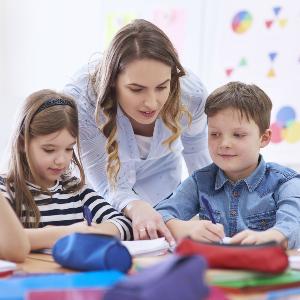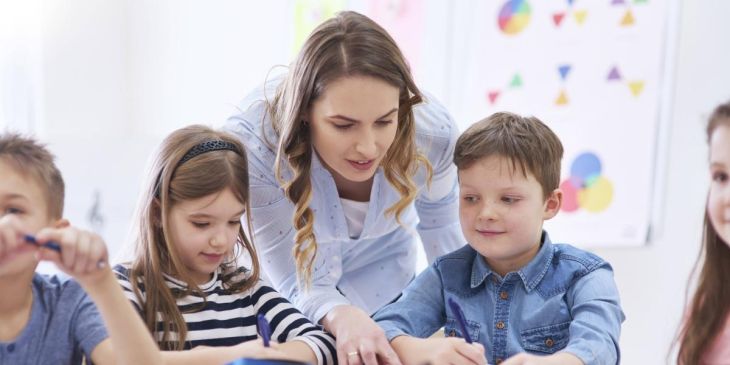
A positive perception of their own abilities spurs children on. | © IMAGO / Westend61
Pressure to get good grades, stress finding the ‘right’ school to move up to: For many children, the joy of learning fizzles out before they have even left elementary school. Yet their first years at school should be a protected space in which to develop their personality and nurture their ability to learn, says Professor Katrin Lohrmann, Chair of Elementary School Education and Didactics at LMU. Accordingly, she encourages her students to focus their teaching not on grades, but on the individual child and their development, and to strive for collaboration in the staff room.
Grades are a touchy subject, especially when the time to move up to secondary school draws near. No grades are given at all in the early days at elementary school. Why is that?
Katrin Lohrmann: In the first years at elementary school, the stated aim of educational activity is to boost children’s self-concept. Elementary school is a place that shapes the way learning is perceived. It should encourage personal development and nurture the ability to learn; and it should show children how enriching it is to discover the world and learn new things. We create a protected space and try to make the children stronger and show them their latent talents.
Isn’t doing without grades just a way of going soft on the children?
To some extent, yes. But a positive perception of their own abilities spurs them on. It kindles a sense of fun in learning and leads to better performance. Conversely, better performance reinforces their self-concept.
Wherever you have grades, there are winners and losers.Katrin Lohrmann
What school grades do
What changes when grades come into play?
Wherever you have grades, there are winners and losers. Grades are an open invitation to compare yourself with others and see where you stand in the class rankings. This being the case, the introduction of grades is difficult for many children. A negative perception of their own abilities frustrates them and often triggers poorer performance. Children very quickly get a feel for the fact that, at school, some abilities count more than others. That is painful. Moreover, if a child gets the impression that the only point of learning is to write exams, the content itself – and the joy of tackling it – becomes less important.
So, grades are intrinsically negative?
The problem is that neither the children nor their parents know what is actually behind the grades. Grades are a condensed form of information. Sometimes they reflect learning development, at others merely the end result. At times, they also say something about how much effort a child has put in, or how well they have worked together with others. Grades therefore need to be interpreted – but are often provided without any such interpretation. Another thing: Grades are fairly good at reflecting performance in relation to a given class, but not across different classes. In our research, we speak of a negative reference group effect.
Alternatives to grades
News
Spotlight: education
Read moreVerbal assessments turn the problem around and provide too much information.
Research findings show that the potential of verbal assessments is often not fully exploited in practice. To be able to give detailed feedback, a teacher has to accompany each child’s learning process very precisely. In a class of 25 individuals, that is not easy. In addition, assessments are often hard for parents to decode – especially where language barriers exist.
Would it be better to have student-teacher conferences?
Not necessarily. It depends on how such a student-teacher conference is conducted. Children can benefit greatly from this kind of feedback situation if they have learned to think about their learning pathway and talk to their teacher about it. The biggest opportunity here is to focus on the child’s individual development.
And in the end, the parents want grades after all as the move to secondary school bears down on them. And so much depends on that.
I don’t believe that parents want grades. It is rather the current legal requirements that prescribe them. I see the conditions surrounding the move to another school as problematic. It would be important for all concerned to stay a bit calmer. In reality, however, that is often difficult.
Would it be better to give greater consideration to parents’ wishes in Bavaria, too?
That in turn creates other problems and can add to social inequality, for example. More highly educated classes then send their kids to high school, while less educated classes don’t. The question should rather be whether or not to extend the freedoms granted in the first two years at school and dispense with grades for longer. But merely leaving out grades is not enough. That does not really change a lot initially.
It would be better to have the courage to change the way we teach, to focus on the child and their learning and to discover children’s potential.Katrin Lohrmann

Professor Katrin Lohrmann
Chair of Elementary School Education and Didactics at LMU
What would be better, then?
It would be better to have the courage to change the way we teach, to focus on the child and their learning and to discover children’s potential. That asks a lot of the teacher, but there are many examples of how this can work well in practice.
What advice do you give to your students, who want to become teachers?
We encourage them to focus on and accompany the learning process and to use the freedoms at their disposal. Many teachers find their own successful approaches – for example by letting the children produce portfolios instead of writing a test. Children complete these tasks in such different ways that the issue of comparison does not even arise. But above all, we urge our students to rethink school beyond the limits of existing structures, to cultivate fresh visions. How can we – how should we – in future design schools that are a central place of learning for all pupils?
Despite the current shortage of teachers and the inflexible structures, is there anything that makes you optimistic? Digitalization, maybe?
Digitalization harbors many ways to rethink the way we teach, value diversity and encourage children to learn together. But cooperation is the most important thing. Lone rangers are not a viable model for the future. Rather, we need to work in professional teams in which we develop lessons together, discuss problems and support each other. The same goes for the children. Acquiring knowledge together is an ability that both children and adults need.









